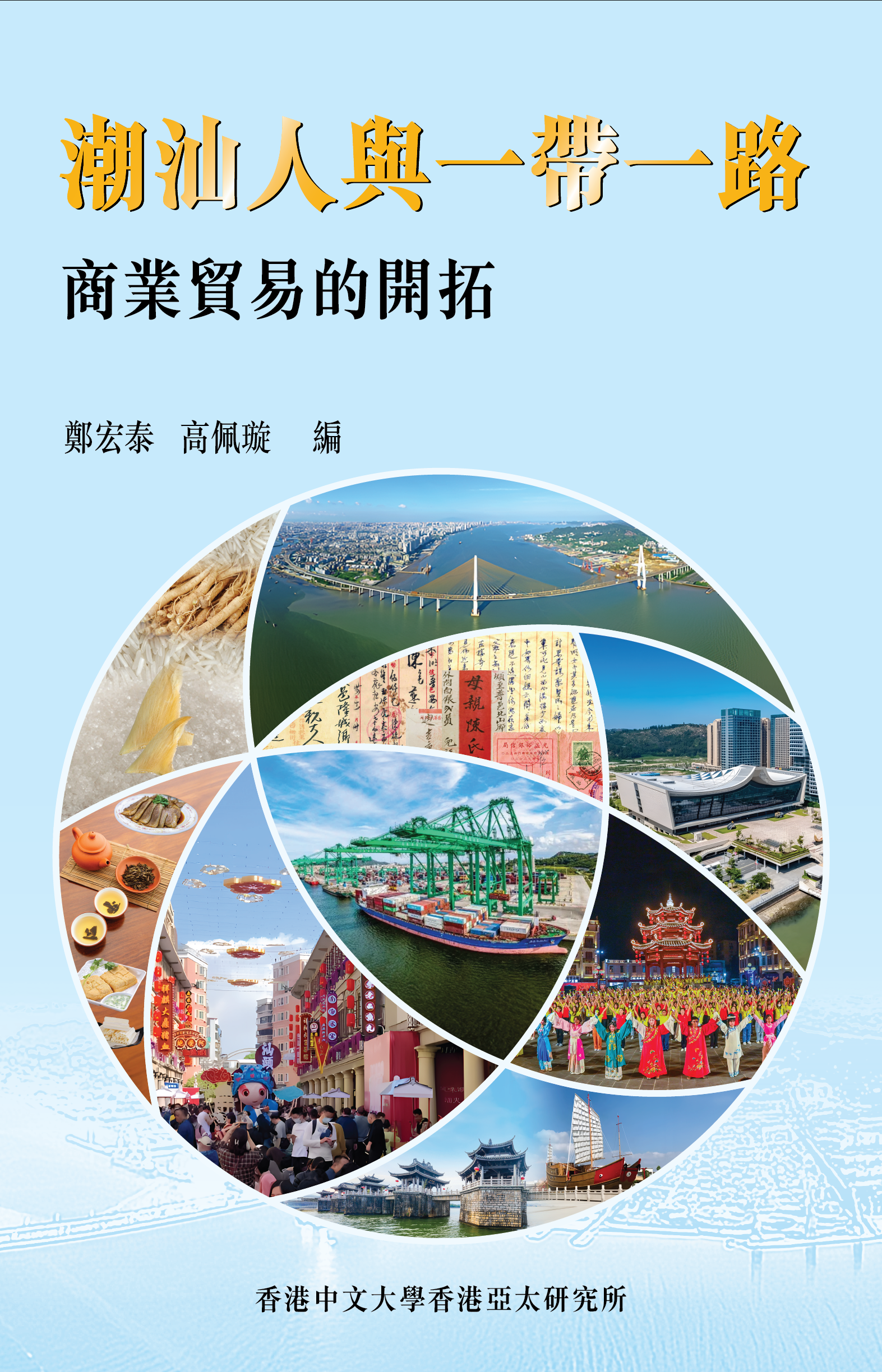 |
|
|
| National Strategy & Implementation |
|
| |
| * Policy Research @ HKIAPS member |
On Belt and Road Initiative
|
|
The Chaoshan People: Opening Up Trade in the Belt and Road Regions
Investigators: Victor W. T. Zheng*, & Pui-shuen Ko
Funding source: Federation of Hong Kong Shantou Community Organizations |

The Chaoshan region is a homeland of overseas Chinese and one of the main ancestral homes of compatriots from Hong Kong, Macau, and Taiwan. The people of Chaoshan have a pioneering spirit and have been the forerunners and builders of the Belt and Road Initiative. They primarily embarked on overseas journeys via Hong Kong for livelihood and business reasons. Not only did they export Chinese agricultural, mining techniques, handicrafts, and culture overseas, but they also absorbed novel foreign elements and brought them back to China, becoming a bridge connecting their hometowns with the global community, with Hong Kong serving as a central hub.
The Chaoshan People: Opening Up Trade in the Belt and Road Regions, edited by Victor W. T. Zheng and Pui-shuen Ko, delves into the realm of commerce, exploring the remarkable journey of Chaoshan people as they navigate the Belt and Road initiative. With Hong Kong as their initial launching pad, this book examines the profound impact that they have had on cross-regional trade cooperation and social interactions.
The book is divided into three sections: “Depicting the Cultural Landscape,” “Constructing Socio-economic Networks,” and “Running International Trade.”
The first section, “Depicting the Cultural Landscape,” begins with Prof. Chunsheng Chen’s article, “The Chaoshan People Going Global: History and Culture”, which examines the cultural characteristics of Chaoshan businessmen and compares them with businessmen from other regions in China. Following this, Prof. Takeshi Hamashita presents his work on “Asia’s Maritime Trade Circle and the Chaoshan Business Network: A Discussion Based on Tsung-i Jao’s Compilation of ‘The Gazetteer of Chaozhou’”, in which he analyses the significance of Chaoshan businessmen in the Asian maritime trade bloc based on the famous compilation by Prof. Tsung-i Jao. Next, Prof. Chak Yan Chang’s essay, “How Did Chaoshan Culture Take Root and Thrive?”, explores Chaoshan culture through the lens of German philosopher Hegel’s theories on civilization and culture. The last chapter, titled “Chaoshan Ancestors in Cuba” and written by Prof. Kin-sheun Louie, delves into the history of Chaoshan coolies in Cuba during the 19th century.
The second section, “Constructing Socio-economic Networks”, comprises four chapters. The first chapter, “From Qiaopi Trade to Belt and Road: The Construction and Transformation of the Chaoshan Business Network in Southeast Asia”, by Dr Huimei Zhang and Prof. Hong Liu, focuses on Chaoshan businessmen in Singapore and their trading network in Southeast Asia. Prof. Pui-tak Lee then presents “Industrial Chain and Ethnic Networks: The Rise of Hong Kong’s Chaoshan Businessman Po-shan Liu from 1948 to 1960”, a discussion of how Po-shan Liu developed his business through close relationships with the Chaoshan community in Hong Kong. Lastly, Dr Joseph W. W. Chan explores the history of Chaoshan people in Indonesia in his essay “Indonesian Chaoshan People along The Maritime Silk Road and China-Indonesia Economic Cooperation”.
The final section, “Running International Trade”, features Prof. Chi-cheung Choi’s presentation on the “Rice Trade and the Transaction Network between Hong Kong, Singapore, Thailand, and Shantou,” which traces the roots of the present-day Belt and Road Initiative. Additionally, Prof. Gordon C. K. Cheung and Prof. Chak Yan Chang discuss “Chaoshan People and the Operation and International Trade of the Hong Kong Shark Fin Industry”, shedding light on the rarely discussed participation of Chaoshan people in the industry. Prof. Guanmian Xu investigates a dispute over the taxes on Chaozhou sugar exported to Northern China in his article “Selling Chaozhou Sugar to the North and the Warehouse Case in the Early Republican Era”. Lastly, in their article “Chaoshan Businessmen and the Development of the Chinese Medicine Industry in Hong Kong”, Dr Yuk-sik Chong and Dr Victor W. T. Zheng explore the history of Hong Kong as an entrepot for Chinese medicine and the contributions of Chaoshan businessmen in this field.
|
More about the book:  |

|
|
|
|
|
Education as soft power: Hong Kong-trained non-local university students’ connections and their career plan in Hong Kong
Investigators: Victor Zheng* (PI), Siu-lun Wong, Anthony Y. H. Fung*, Kevin T. W. Wong, & Hua Guo
Funding source: Public Policy Research Funding Scheme, Policy Innovation and Co-ordination Office, HKSAR Government |
Completion date: May 2020

Could Hong Kong increase its soft power through its generosity in welcoming non-local students? Answers to this query may have policy implications well beyond the realm of education.
Hong Kong has long had a reputation for offering high-quality higher education and, over the past several decades, has witnessed a steady influx of non-local students to its tertiary institutions. However, exactly how open and “international” this sector should be remains understudied. Many argue that priority should be given to locals over non-locals in University Grants Committee (UGC) funding, while some have criticized the authorities’ preference for mainland Chinese over other non-local students. The aim of this research is not about finding the optimal way of distributing resources between local and non-local students in Hong Kong but to empirically explore the necessity and rationale of the policy.
Developed Western countries tend to welcome or even proactively recruit international students. This friendly approach is motivated by considerations beyond that of earning revenue, including a desire to restructure the population, reposition the country economically, and broaden the country’s cultural influence. Such a policy is in fact part of a strategy to project the country’s “soft power”, as Joseph Nye, who coined the term in 1990, argued. Unlike hard power, which is based primarily on military and economic might, the strength of soft power lies in unconscious ideological affinity, common values, and cultural attractions. In that sense, education may be an effective platform for nurturing such affinities.
The national “Go Global” strategy, as well as the recent Belt and Road Initiative, emphasize the necessity for China to further integrate with the world. Hong Kong has historically functioned as a hub connecting China and other parts of the world via socio-economic networks. Strong soft power would allow Hong Kong to play the role more efficiently. Based on this context and from the perspective of soft power, the research team aims to examine the question of whether the educational experience of Hong Kong-trained non-local university students—regardless of their ethnic background—could in fact strengthen Hong Kong’s soft power. Qualitative and quantitative approaches would both be adopted in the investigation, which would include a questionnaire survey, in-depth interviews, and a comprehensive analysis of literature and secondary data. It is hoped that the results of the research will offer empirical support for the formulation and implementation of related policies.
Full report:  |

|
|
| | | | | |  |
|
| |
|
| |
|
|
|
|
|
|
 |
|
|
|